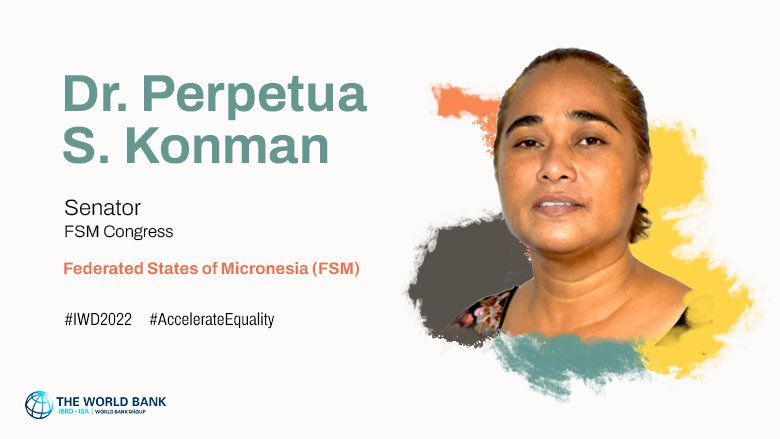After he passed away, the same group of people encouraged me to enter politics on their behalf. So, I did. I told those people that I still needed their support to teach me what my husband was doing to improve the community. That same group of people are still supporting me, and I hope that we can continue.
If you could describe yourself in three words, what would they be?
We as health workers are caring, humble and supportive. Those are my three main ones. And loving.
The leaders of the Federated States of Micronesia (FSM) are predominantly men. Regarding climate change, our main problem is that it impacts the islands because of high tides. We have people migrating because of climate change. More than half of our population is living abroad, and so it’s getting more difficult for women to have a voice in running our government at the national level. That’s even harder with the presence of climate change and COVID-19.
Women started the Chuuk Women’s Council and created those pathways for us. But, at a state level, most leaders are men and have not passed laws that allow women to have protection and security so that we have the freedom to do what we wish. As a doctor, I understand that we must review our treatment of diseases based on their resistance to treatment. The same goes for policy; we need reforms that depend on the needs of our people and country. We need a voice in our government on behalf of women. It’s not just about income or the economy, but the welfare of women and children.
Medicine. I attended a school funded by the John A. Burns School of Medicine in Hawaii called the Pacific Basin Medical Officer Training Program. It was established in the 1980s and closed in 1991. I was lucky that I didn’t have to leave FSM for medical training.
I would love for FSM to have more research into what we are aiming to address, as that will give us more knowledge of what we can really change. In a country with limited financial support, we must study issues carefully before we decide where to use money or else it will just disappear, and we suffer more. Climate change is the main issue that we must work on right now.
Our culture only allows men to be chiefs. They’re the only ones that welcome people in our villages and have the power to talk in front of the people. If traditional leaders can make an adjustment for women to be involved in these activities, women who work hard and improve our villages, it will make a big change and improve gender equality in our nation. The Constitution of our nation gives freedom equally for both genders.
The number one is family support, from both sides; the wife and the husband. In my region, the chiefs decide which people can campaign in elections, because they already agree that this is our candidate or the person they will support. The male in the family can talk to the chief and they will agree. It will make a big difference if a female candidate is supported by the chiefs. With their support a woman can win elections.
**The views expressed in this interview do not necessarily represent the views of the World Bank Group.

